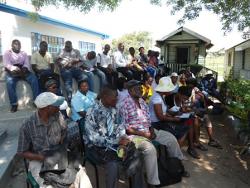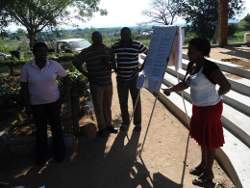For the next three years, Dumisani Rebombo, Sonke’s One Man Can Manager, will run a new One Man Can (OMC) project in Bushbuckridge, Mpumalanga and Limpopo. Bushbuckridge Local Municipality (LM), in the central lowveld, plays host to Wits Rural Facility (WRF), not far from the Kruger National Park.
 The WRF performs a wide range of community service activities, including training, legal support, lobbying for better infrastructure, and organisation. Its service, research and teaching activities are aimed at improving the lives of people in the Bushbuckridge area and at including issues relevant to the lives of rural people on research and teaching agendas in South Africa. This makes Bushbuckridge an ideal community to work with, as there are research facilities and a basic structure from which to operate. The OMC project is currently in its initial phase, and is set to expand in the near future.
The WRF performs a wide range of community service activities, including training, legal support, lobbying for better infrastructure, and organisation. Its service, research and teaching activities are aimed at improving the lives of people in the Bushbuckridge area and at including issues relevant to the lives of rural people on research and teaching agendas in South Africa. This makes Bushbuckridge an ideal community to work with, as there are research facilities and a basic structure from which to operate. The OMC project is currently in its initial phase, and is set to expand in the near future.
Expanding the evidence base
Sonke has an unprecedented opportunity to work with world recognized researchers to evaluate the impact of our work. Together with the University of Witwatersrand, University of North Carolina, Chapel Hill, University of California San Francisco and the London School of Hygiene and Tropical Medicine, Sonke will bring its expertise and experience in innovative community mobilisation methods to engage men and boys for gender equality.
The goals of the project are to determine whether young people in villages that undergo mobilization interventions demonstrate positive changes in gender norms compared to young people living in villages that have no intervention. Sonke will implement the One Man Can Campaign in 11 intervention villages over three years and then compare gender and HIV and AIDS outcomes from our work in those villages against the 12 villages randomized as control villages (who will not receive our intervention).
The results will provide empirical evidence of OMC’s effect on behaviour change and its impact within communities. The 25 villages will be monitored for incidences of gender-based violence including rape, HIV prevalence, health-seeking behaviours including self-reported habits of condom use, and more. After three years these data will be compiled to assess the tangible effects of the OMC’s community mobilisation model, and OMC will be implemented in the control group. This is the first time anywhere in the world that a randomized control trial will evaluate the impact of a community mobilization based intervention aimed at changing men’s gender and HIV related attitudes and practices.
OMC building skills
 To bolster and continue the work done in workshops and other OMC events, OMC community mobilisers will recruit members of the community as local leaders, mentors and educators, and will work with them to establish Community Action Teams (CATs). Because the specific needs and social structures of each community differ from place to place, mobilisers and CATs undergo training and education in navigating these structures to most effectively and sensitively implement the campaign in their areas. Ongoing training provides CAT members with a wide range of relevant skills and knowledge, including reporting, networking, health education, refugee and migrants’ rights and advocacy on local platforms.
To bolster and continue the work done in workshops and other OMC events, OMC community mobilisers will recruit members of the community as local leaders, mentors and educators, and will work with them to establish Community Action Teams (CATs). Because the specific needs and social structures of each community differ from place to place, mobilisers and CATs undergo training and education in navigating these structures to most effectively and sensitively implement the campaign in their areas. Ongoing training provides CAT members with a wide range of relevant skills and knowledge, including reporting, networking, health education, refugee and migrants’ rights and advocacy on local platforms.
The mobilisers, who will hold greater responsibility managing the teams, participate in extensive training that focuses on leadership skills. Components of the training motivate mobilisers to cultivate greater personal insight and improve their public speaking and workshop facilitation skills. Towards the beginning of their involvement with the campaign, mobilisers shadow workers at Sonke and other partner organizations to learn about and develop skills in the variety of processes involved in running and coordinating a project within an organisation. They also receive intensive ongoing training through supervision, Train the Trainer programme, refresher courses and capacity building modules. In this way, OMC projects have the extra benefit to the community in providing skills and leadership training to locals.
We thank Dumi for coordinating this project and we expect exciting research and results to emerge from this new undertaking. Watch this space!

